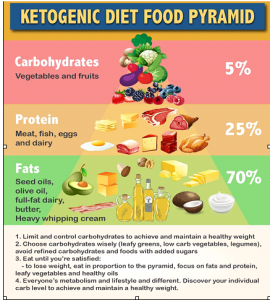Assistant Leactur Ahmed A. Hussein
Agriculture College /Animal Production Department
Keto Diet It is a diet low in carbohydrates 5%, medium protein 25%, high in fat 70%, a diet that works to lose weight significantly, by providing the body with energy through fats instead of carbohydrates, this system was used in medicine primarily to treat Cases of epilepsy that are difficult to control in children, and that the word keto is a small fuel molecules called ketones oketon. These ketones are stored in the liver as a source of energy when the main source of energy, glucose, is not available, and thus the body becomes a fat burning machine. (Bergqvist, 2011)
Epilepsy
Epilepsy is a common disease in neurology after stroke, as the number of people with this disease in the world has reached nearly 50 million people, diagnosed in people who have unexplained recurrent seizures. This occurs when neurons in the cerebral cortex are over-excited, temporarily disrupting normal brain function(Pediatric, 2009).
The ketogenic system in the human body (how it works)
Many studies have proven that this diet has many benefits in terms of mental activity and focus, and also that the person does not feel hungry, unlike other low-fat diets. Through this ketogenic diet, the body enters a stage called ketosis, which is the replacement of the main source of energy, which is glucose Which the body depends on as a source of energy is the source of fat, and thus the body becomes a fat burning machine, and that every movement, no matter how small, that the body makes needs energy, even when a person sleeps needs energy, as well as every mental activity also needs energy, which helps to lower Insulin levels and thus the ease of burning stored fat in the body (Hartman, 2007).
When does the body go through the stage of ketosis?
This stage occurs when insulin and glucose levels drop in the body, and this happens as a result of two things, the first when reducing carbohydrates and increasing the percentage of fat in the diet, and the second thing is fasting, where carbohydrates are continuously and naturally reduced. (Healthline, 2020).
People who are not recommended to follow the ketogenic diet
Pregnant and lactating women.*
Children and adolescents under 15 years old.**
People with diabetes who take insulin, as well as type 1 diabetes.***
. People with high blood pressure and taking blood pressure medications****
Beverages, foods, and vegetables ideal for a keto diet
Water, coffee, tea, meat, cheese, eggs, natural oils, olive oil, butter, tomato, cucumber, olives, broccoli, spinach, eggplant, peppers of all kinds.
Foods and Foods Prohibited on the Keto Diet
Bread, rice, potatoes, candy, chocolate, sugar, soft drinks, pasta, and sweet fruits. (healthlin, 2020).
Benefits of the ketogenic diet
The many health benefits of this system have the same benefits as low-carb diets, but this diet has more benefits because of the very low carbohydrate content compared to other low-carb diets.
Health improvement-1
The ketogenic diet significantly improves the risk of heart disease, in terms of improving cholesterol, triglyceride and HDL levels.
Control of appetite-2
When following this ketogenic diet, appetite will be controlled or controlled. This is what scientific research has proven, as this system makes a person eat less food, due to the energy stored in the body as explained previously, and thus leads to losing excess weight as the body burns fat twenty-four hour a day. Also, the human body is in a good stage to get rid of type 2 diabetes, as the person wants to eat two to three times a day, and in most cases, breakfast is omitted. Food, this diet puts the body in a state in which the appetite is low, and thus to psychological satisfaction. In the end, dieting becomes easy for him.
3-Weight loss
Many researches have proven that the ketogenic diet has a good effectiveness in losing weight compared to other low-carb diets, that the body turns into a fat-burning machine when fat is replaced as an energy source instead of insulin and glucose, and thus leads to significant weight loss, in addition to not feeling hungry.
4-Stomach comfort
Following this diet leads to a lot of rest and calm for the stomach, in addition to getting rid of pain and cramps and less gas, and sometimes gases disappear. For some people, these features are very important.
5-Mental performance and continuous energy
Some people follow this ketogenic diet to increase energy in the body because this system works on a continuous flow of fuel, where energy is derived from ketones. And then send them to the brain, and thus to the disappearance of confusion and increased concentration, and leads to an increase in mental performance, as the brain in this case does not need carbohydrates because brain fuel is provided by ketones. It is considered a good fuel for energy and focus.
-Endure physical exertion6
The ketogenic diet helps withstand the physical effort, by supplying the body with continuous energy from energy stores, which suffice the body for several weeks, as the body is not equipped with energy through carbohydrates.
7-Getting rid of the second type of diabetes
This diet is the ideal treatment for patients with type 2 diabetes, as research has proven that this diet has the ability to control blood sugar levels, because ketones reduce the negative effect of high insulin, as well as reduce the level of sugar in the blood..
8-Other benefits such as
Returning blood pressure to its normal state, treating acne, controlling migraines, improving mental health, eliminating mental disorders and problems, treating and limiting the development of Alzheimer’s disease(Jessica migala, 2019)
How to enter the ketosis stage while following the keto diet
1-Carbohydrates do not exceed 50 grams per day.
2-Eat proteins in moderation.
3-Eat enough fat.
4-Avoid snacking when you are not hungry.
5-Intermittent fasting.
6-Do exercise.
7-Get enough sleep. (Jessica migala, 2019).
Signs and symptoms of the keto diet that occur when entering ketosis
1-Dry mouth and increased thirst.
2-Increased urination.
3-The smell of breath (similar to acetone.
4-Positive signs such as weight loss, reduced hunger, and improved health.
Keto Diet side effects and side effects
Mostly when you follow the keto diet, you will experience some symptoms of the so-called keto flu, but these symptoms do not last for a long time, most likely these symptoms last for two days and not more than a week, and include the following:
Headache, fatigue, dizziness, mild nausea, difficulty concentrating, lethargy, constipation, heart palpitations, leg cramps, agitation and nervousness.
Because of the carbohydrate-rich diet, which leads to water retention in the body, and thus the keto flu occurs, and the keto diet by increasing fats and reducing carbohydrates will lead to losing a lot of this fluid and thus urinating a lot, which leads to getting rid of excess salt. (Amy goriu, 2018).
Long-term effects of the keto diet
In addition to all of what we mentioned as potential damage to the keto diet in the short term, some warnings about the dangers of the keto diet can be added as follows:
1-Depriving the body of the group of minerals and vitamins that we get mainly from vegetables and fruits, and nutrition experts fear that following the keto diet in the long term is more dangerous than obesity and overweight due to lack of vitamins and minerals (Caroline Shannon-Karasik, 2019)).
2- Its effect on athletes: One of the negative effects of the keto diet on athletes is that it reduces their physical ability and threatens the effectiveness of exercises in building muscle, so athletes resort to the periodic keto diet.
3-It may be dangerous to the blood vessels and may cause damage to the lining of the vessels, as people who follow the keto diet are exposed to an imbalance in blood sugar levels and the way the body receives it when they get a short break from keto
(Caroline Shannon-Karasik, 2019).
4-The effect of this system on digestion: In the ketogenic diet, the body is kept away from starchy vegetables necessary to maintain the work of beneficial bacteria in the intestines Probiotics, which may lead to the weakening of the microbiome, which has a major role in resisting infections and strengthening immunity (Sophia Mitrokostas, 2019)
5- The keto diet deprives us of most sources of fiber, which may cause digestive problems such as diarrhea or constipation and indigestion, but nutrition experts advise those who follow keto to eat a large amount of leafy and cruciferous vegetables free of starches and sugars, in addition to eating yeasts that are useful for making a device digestion.
6-Eating fats may be dangerous in the long term: One of the most important tips for following a safe keto diet is to avoid getting unhealthy fats and processed meat, but some resort to fats, regardless of quality and source, will be dangerous in the medium and long term..
7-The keto diet may lead to acute pancreatitis: One of the cases that doctors have noticed is the association of the keto diet with acute pancreatitis, but this is mainly related to the presence of a history of chronic triglycerides and pancreatitis, poor long-term keto diet and poor selection of fats (Sophia Mitrokostas ,2019)).
8-Where research and studies have proven that eating red meat continuously may triple the risk of chemical heart disease (Amanda MacMillan, 2019), and since the keto diet requires eating large quantities of red meat constantly, it may not be a good option in the long run, However, we reiterate the possibility of maintaining keto while avoiding its long-term damage by carefully choosing and balancing sources of fat and protein..
9- Bad breath: Bad breath is one of the common and permanent effects of the keto diet, as a result of eating fat and meat in general, and as a result of the secretion of acetone with exhalation, and the best solution is regular dental care, eating green mint or sugar-free mint gum and drinking water constantly . (Caroline Shannon-Karasik, 2019).

References
Bergqvist AG. Long-term monitoring of the ketogenic diet: Do’s and Don’ts. Epilepsy Res. 2011 Aug 18;100(3):261–6. doi:10.1016/j.eplepsyres.2011.05.020. PMID 21855296.
potassium citrate reduces kidney-stone incidence with the ketogenic diet. Pediatrics. 2009 Aug;124(2):e300–4. doi:10.1542/peds.2009-0217. PMID 19596731
Hartman AL, Vining EP. Clinical aspects of the ketogenic diet. Epilepsia. 2007 Jan;48(1):31–42. doi:10.1111/j.1528-1167.2007.00914.x PMID 17241206 “نسخة مؤرشفة”. Archived from the original on 13 أغسطس 2017. اطلع عليه بتاريخ 29 أبريل 2018.
Jessica migala (what to eat and avoid on the ketogenic)
Retrieved 5-2-2019.
Amy goriu (11-2-2018)
The 11 biggest keto diet dangers you need to know about
Retrieved 6-3-2019 edited.
healthline.com , The Ketogenic Diet: A Detailed Beginner’s Guide to Keto , 15/4/2020
https://www.healthline.com/nutrition/ketogenic-diet-101 :https://www.ruled.me/guide-keto-diet/
Caroline Shannon-Karasik “الآثار الجانبية للكيتو دايت التي يجب معرفتها قبل تجربته”، منشور في instyle.com، تمت مراجعته في 19/12/2019
مقال Sophia Mitrokostas “سبعة أسباب تمنعك من اتباع نظام الكيتو على الأمد الطويل”، منشور في insider.com، تمت مراجعته في 19/12/2019
مقال Amanda MacMillan “خمسة أضرار طويلة الأمد للكيتو”، منشور في health.com، تمت مراجعته في 19/12/2019





























































